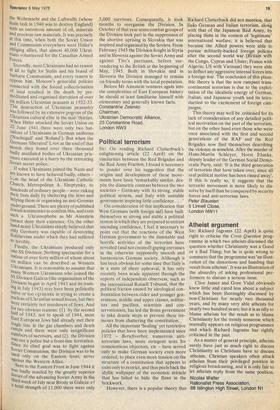Political terrorism
Sir: On reading Richard Clutterbuck's enlightening article (22 'April) on the
.similarities betWeen the Red Brigades and
the Red Army Fraction, I found it necessary to ponder over his suggestion that the origins and development of these movements have been 'remarkably similar, despite the diametric contrast between the two societies — Germany with its strong, stable political system, and Italy with unstable government inspiring little confidence. . On consideration of this implication that West Germans (with foreign aid) have built themselves so strong and stable a political system in which they are prepared to entrust unending confidence, I feel it necessary to point out that the reactions of the West German government to the damnable and horrific activities of the terrorists have revealed (and not created) gaping crevasses in the otherwise supposedly smooth and harmonious German society. Although it has been obvious for some time that Italy is in a state of sheer upheaval, it has only recently been made apparent through the reports of independent observers, such as the international Russell Tribunal, that the political friction caused by ideological confrontation between older and younger generations, middle and upper classes, militarists and pacifists, scientists and conservationists, has led the Bonn government to take drastic steps to prevent these tremours from shattering the constitution.
All the important 'healing' yet restrictive policies that have been implemented since 1972 — Berufrverbot, numerous antiterrorism laws, more stringent tests for conscientious objectors, etc — have served only ,to make German society even more ordered, to place even more tension on the structure of a constitution that appears to exist only to restrict, and thus peels back the idyllic wallpaper of the economic miracle that has failed to hide the flaws in the brickwork.
However, there is a popular theory that
Richard Clutterbuck did not mention, that Ilinks German and Italian terrorism, along
with that of the Japanese Red Army, by placing thekn in the context of 'legitimate' international warfare; it is believed that because the Allied powers were able to pursue militarily-backed foreign policies after the second world sitar (Thitain with the Congo, Cyprus and Ulster; France with Algeria; US with Vietnam) they were able to deflect any aggressive internal forces into a foreign war. The conclusion of this plausible theory is that the now rampant transcontinental terrorism is due to the exploitation of the idealistic energy of German, Italian, and Japanese youth and its introduction to the excitement of foreign campaigns.
This theory may well be criticised for its lack of consideration of any detailed political motivation on the part of the terrorists, but on the other hand even those who were once associated with the first and second generations of the RAF and the Red Brigades now find themselves describing. the violence as senseless. After the murder of Hans-Martin Schleyer, Horst Ehmke, deputy leader of the German Social Democratic Party, said: 'It is the third generation of terrorists that have taken over, since all real political motive has been rinsed away'. If this is really so, it suggests that the terrorist movement is more likely to dissolve by itself than be conquered by security forces and anti-terrorism laws.
Peter Blausten 5 Linnell Close, 'London NW11






































 Previous page
Previous page